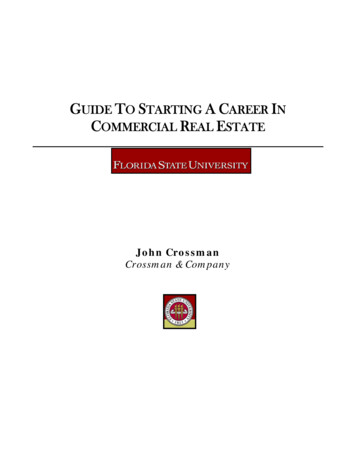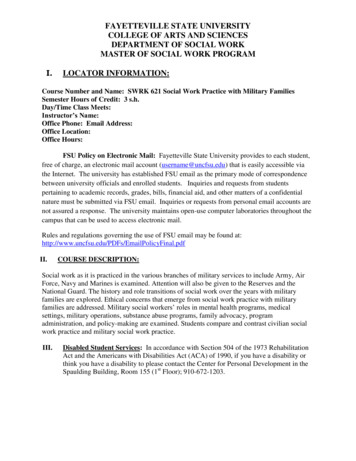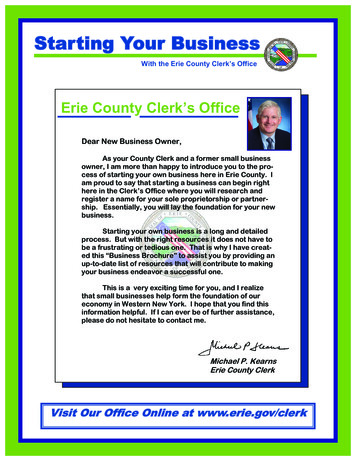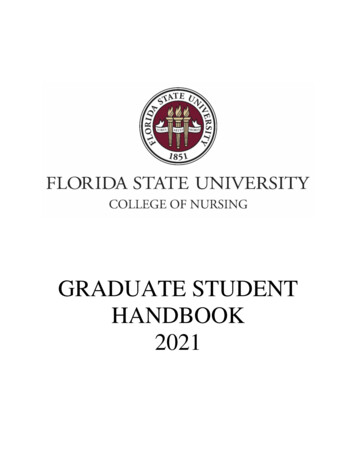
Transcription
GUIDE TO STARTING A CAREER INCOMMERCIAL REAL ESTATEJohn CrossmanCrossman & Company
TABLE OF CONTENTSIntroduction . 3Areas of Specialization . 4Location, Location, Location . 8Networking. 10The Job Search . 13Developing Opportunities For Your Future . .14The Interview . 16You Found A Job. Now What?. 18Career-ing . .19How to Make Major Decisions . 2010 Things That Will Get You Hired . 2110 Things That Will Get You Fired .22Personal Resources . 23Top 10 Tips. . .262
INTRODUCTIONCongratulations! You have decided to enter into one of the most important and interesting career fields available today –Commercial Real Estate. But before you take this exciting and life-changing step, we would like to share some insights thatwill guide you into a rewarding, successful career in commercial real estate.This Guide, will provide you with valuable insights and perspectives to help make the right choices for your career. Our goalis to ensure you have the proper tools to transition from the academic world to “the real world.”This guide will not guarantee you an interview or secure the perfect job or even help you pass your final exams. It will,however, help you begin to think about real estate career opportunities in a broader perspective. It will also challenge you toask some important, but tough questions about yourself, your goals, your ambitions and your happiness. After all, Life,Liberty and the pursuit of Happiness, it’s the American Way.We hope this booklet will assist you in finding your path to a successful, happy and prosperous career. But just as we reachout to help you, we ask you to reach out along the way to help others that can benefit from your time, talents, love andgenerosity. Thanks, and enjoy!“Invest in real estate. God isn’t making any more of it.”Will Rogers, Tony Soprano3
AREAS OF SPECIALIZATIONOne of the exciting things about commercial real estate is that it can be approached from so many different areas. You canuse your skills to project and analyze cash flows for new developments; broker large transactions with institutional clients; orexercise your entrepreneurial spirit as a property owner developing new and exciting ventures.Before graduation one of the first decisions you need to make is what area of commercial real estate you are interested inpursuing. We believe this is the perfect time for some self-evaluation and a personality analysis will assist in determiningwhat area would be best suited to your profile. Tests are available via the Internet (www.myersbriggs.com,www.keirsey.com, www.2h.com).Also, consider the following when making your decision: What do you thrive on? Interaction with people, Analysis, Research, Closing deals, Managing people.Ask your professors to rate your strengths and opportunities. They might surprise you with their insight!Apply for an Internship – it’s one of the best way to test-drive, before you buy.Determine the form (base salary vs. bonus/commission) of compensation you desire and can afford. Do you require asalary or can you risk commission structure? The following table outlines the major Areas of Specialization andaverage compensation structures.Area ofSpecializationLeasing nalGovernmentLending / BankingMarket ResearchProperty ManagementAccountingAnalystsMortgage BrokersProject ManagementAsset issionSalarySalaryEntry Average 1st YearCompensationAverage 5th YearCompensationOnce you determine your personality traits and compensation requirements, you can bridge those traits to the appropriateskill set needed for each Area of Specialization.4
Brokerage and LeasingReal estate agents that represent buyers, sellers, owners or tenants must be licensed by the states in which they work. Moststates require a test before issuing a sales license, or for more advanced brokers, a license is based on experience andeducational requirements.Visit http://www.state.fl.us/dbpr/re/index.shtml or call 888.204.6289 for more information on testing in the State of Florida.Also, great study tools are available through www.bertrodgers.com.Residential agents represent buyers or sellers in exchange for a fee, payable when a sale is completed. This productivitybased segment requires long and uncertain hours, often resulting in a high agent dropout rate.Commercial brokerage requires people skills and a higher level of technical business knowledge. Most successfulcommercial agents need at least an undergraduate education and many have graduate degrees in business, enabling themto work with corporations, tenants, institutional buyers and sellers, domestic and foreign business entities and a host ofsophisticated investment and business clientele. Most commercial agents specialize in specific property types such asindustrial, office, retail, hotels, or apartments. Continued education is available through a variety of trade associations.Successful commercial agents can earn executive-level compensation. They must closely watch markets to anticipateeconomic trends affecting the real estate industry.For more information on residential brokerage, see the National Association of Realtors, NAR.For commercial brokerage, see CCIM.For industrial property, see NAIOP.For office and industrial, see SIOR.For retail, see ICSC. And for Commercial Real Estate Women, see CREW.Construction and ArchitectureYour education and experience in commercial real estate can open opportunities in some areas of the industry you may nothave considered. These being in the architecture and construction segments of the real estate development process.To be an architect or contactor it requires special education, experience and licenses but there are areas within thesedisciplines where your specific education and experience can qualify you for. Many major architectural and contracting firmshave internal business development/marketing departments. These positions generally do not require extensive knowledgeof the industries at an entry level, although to prosper and advance within this profession, basic knowledge would need to belearned. Business development in these professions entails extensive involvement and participation in multiple industryrelated organizations, along with strong relationship building within the development and real estate industry. In manyinstances you will become the “face and voice” of your company and will be responsible for public relations, customerrelations, advertising, and other administrative functions such as developing, preparing, and implementing the company’sbusiness and marketing plans.Organizations that can be helpful are: ICSC; ULI; NAIOP, AGC (Associate General Contractors) and AIA (American Instituteof Architects). ICSC is developing education courses and testing for a new professional designation, CDP (CertifiedDevelopment, Design and Construction Professional) which will become a standard of excellence within the retail designand construction segment of the industry and designation which you may want to pursue.Appraisal and ConsultingAppraisers are paid to estimate the value of property after a systematic analysis of the prices of similar properties, or basedon an analysis of discounted future returns. This valuation estimate requires market analysis and the subject property beingappraised. Some appraisers work for a variety of clients on a fee basis; others are internal staff appraisers, producing valueopinions for their employer. Most appraisers specialize in residential property, or specific types of commercial property.Federal laws require that any appraisal required when the government is involved directly or indirectly must be done by astate certified appraiser. Certification is at two levels, residential and general, and is based on a combination of tests andexperience. Trade association designations, which require more experience and education than the state certificationprocess, also are required by many clients, the highest of which is the MAI for Member of the Appraisal Institute.5
The outlook for appraisers involved in specialized commercial appraisal and consulting, such as site analysis, buy versuslease decisions, property tax appeals, portfolio re-valuation, and investment analysis, is quite promising. Many commercialand consulting oriented appraisers work within larger consulting firms including accounting and market research firms.Technology is having a major impact on the commercial and residential sectors of the real estate industry.For more information about appraisal and consulting, see the Appraisal Institute (www.appraisalinstitute.org), and RealEstate Counselors.Corporate Real EstateAll major corporations must deal with real estate needs. Corporate real estate management involves maximizing the firm'svalue of resources devoted to space needs. Once simply viewed as a cost center, corporate real estate managers are nowattempting to improve the efficiency of real estate usage by considering "just-in-time" office sharing and enhancing theproductivity of the work environment. In addition, corporate real estate heads often deal with site analysis; buy versus leasedecisions, acquisition and disposition, portfolio refinancing and sale-leaseback arrangements, property tax appeals and ahost of facility management decisions.For more information about corporate real estate, see the National Association of Corporate Real Estate Executive,NACORE.Institutional Real Estate InvestmentMost of today's large-scale real estate transactions ( 10 million dollars and up) involve institutional investors. Among theseare the Real Estate Investment Trusts (REITs), the larger life insurance companies and pension funds. These institutionsmay utilize commercial brokers in the local markets, but they rely on internal staff to review and analyze proposedinvestments. Often these institutions look for a real estate background, with an MBA degree, when staffing such positions.Institutional investors pay attention to industry niche market trends, tax law trends, regulatory trends, geographically basedeconomic trends, demographic trends and global economic trends, in addition to micro-level real estate analysis.The slogan "think globally act locally" can be applied to today's institutional investment firms because many of them also "actglobally." Whether working with domestic or international trusts, strong analytical skills, the ability to manage portfolios andexcellent communication skills are required.For more information, see the National Institution of Real Estate Investment Trusts, NAREIT, and the National Association ofReal Estate Investment Fiduciaries, NCREIF. Also see RECRA, the Real Estate Capital Resources Association.Property ManagementProperty management involves maximizing net revenues or productivity of property based on managing rental flows, tenantretention, managing and contracting property operation. Property operation includes cleaning, maintenance and repairs,paying utilities, property insurance, property taxes and so on), reporting to owners and overseeing resident or on-sitemanagers. Property managers are usually involved in leasing and facility management decisions. Those that manageseveral properties and are involved in acquisition, disposition, financing and portfolio management decisions are known as"asset managers." Most property managers start as on-site managers, working closely with tenants.Consolidation is the general trend in the industry. Many property management firms are national or international in scopeand are able to take over an entire institutional portfolio of various properties from different cities. Property managers' feesare often based on property rental flows, as well as the complexity of the property management work. For example,shopping center property managers may be involved in tenant merchant associations, joint promotions and advertising. Itinvolves more time than a single tenant industrial property, where the primary management function is accounting-basedcontrol, reporting and monitoring.For more information about property management, see Building Owners Managers Association, BOMA, and the Institute ofReal Estate Management, IREM.6
Mortgage and Construction LendingMortgage lenders specialize by size of loan and property types, like developers or commercial brokers. Primary lenders forresidential single family include mortgage companies that resale loans in the secondary mortgage market, as well ascommercial banks, savings institutions and credit unions. Banks and savings institutions usually pay employees on a salarybasis, sometimes with a bonus. Mortgage companies rely more on productivity-based compensation. Loan officers mustknow about credit analysis, as well as appraisal, title, environmental concerns and a host of other government regulations.Multifamily mortgage lenders act much like commercial mortgage lenders with more emphasis on property analysis includingmarket trends, tenant review, income and expense review as well as the value of the subject property being used ascollateral. Commercial banks and savings institutions provide most of the smaller multifamily loans while life insurancecompanies, pension funds, Real Estate Investment Trusts (REIT) and Securitized Mortgage Loans and pension fundsprovide larger scaled financing.Non-residential mortgage loans involve commercial banks as well as life insurance companies and pension funds as typicalsuppliers of capital. Commercial mortgage lenders require more business education and analytical skills than do theresidential lenders, often requiring graduate education. Mortgage brokers are often used to represent smaller life insurancecompanies and pension funds that cannot efficiently process their own loans. Mortgage brokers work on a commission basispaid after successfully placing mortgage loans that meet the needs of the borrower and lender.Construction lending is the most complicated end of the financing spectrum involving all of the concerns of the permanentmortgage lender (credit, income, expenses, property value and environmental) as well as absorption risk, construction costrisks and delays, and other concerns. Thus, construction lenders are often hired from among the ranks of experiencedmortgage lenders. Most construction lending is provided by commercial banks.For more information about mortgage banking, see the Mortgage Bankers Association, MBA.DevelopmentDevelopers are among the most entrepreneurial of the real estate career paths. They acquire land and prepare it fordevelopment, or acquire the site, as well as oversee the construction process. Developers specialize in residential orcommercial development, and within these they specialize by property size and type.For more information about residential development, see the National Association of Home Builders, NAHB, as well as theMulti-Housing Council.For more information about commercial development opportunities and trends see the Urban Land Institute, ULI, theNational Association of Industrial and Office Parks, NAIOP, the International Development Research Council, IDRC, and theInternational Council of Shopping Centers, ICSC.GovernmentAdditional Resources: Opportunities in Real Estate, by Mariwyn EvansReal Estate Careers: 25 Growing Opportunities, By Carolyn Janik and Ruth Rejnis.Your First Year in Real Estate: Making the Transition from Total Novice to Successful Professional, by Dirk Zeller7
LOCATION, LOCATION, LOCATIONNow that you’ve decided what your Area of Specialization will be, it’s time to narrow down your choices on where you wouldlike to live and why.Use the following guidelines to assist you in making your location decision: Bigger Markets generally equal more opportunity and more compensation (top 20 DMAs listed below); so consider thatthe cost of living is usually higher. Utilize website tools such as www.homefair.com; www.cityrating.com to comparecost of living variations.Market size is determined by a DMA (Designated Market Area) analysis, projected population growth andmaturity/density of market: (see chart on page 13).Top 20 Designated Market Areas(Source: 181920Designated Market Area(DMA)New YorkLos AngelesChicagoPhiladelphiaBoston (Manchester)San Francisco-Oak-San JoseDallas-Ft. WorthWashington, DC -St. Pete (Sarasota)Minneapolis-St. PaulPhoenix (Prescott), AZCleveland-Akron (Canton)Miami-Ft. tona 501,556,6701,496,8101,401,7601,315,0301,303,150% .1898
Percent Change in Population – 2004-2009 (Source: www.census.gov) Local market knowledge is very important, particularly in brokerage, development and appraisal. If these areas are ofinterest, you may choose to stay close to home for your entry-level position.Corporate and Institutional are less dependent on local market knowledge.Consider your immediate family and/or future family plans? Long distance relationships can be stressful and expensive.Consider you appetite for travel? Corporate and Institutional generally require significant travel. Fun in the beginning,but tough in the end. Relocation is almost always necessary to be considered for promotion.Additional Resources: Places Rated Almanac, by David Savageau9
NETWORKINGDid you know that the majority of job opportunities don’t make it into your local newspaper or job search website? How dopeople know about these secret openings? That’s right—networking!The list below offers tips to provide you with some important and proven networking skills, so when that perfect jobopportunity comes along, you’ll be miles ahead of the pack!1. Make a list of everyone you know in real estate. This is the beginning of your career database. Set up informationalmeetings with these people, talk to them, and get their insight. You can also benefit from networking with people whoare not in your area of specialization. If you are seeking a job in development, relationships with contractors andarchitects can be good leads.2. Stay in close touch with your professors. Unlike other majors, real estate professors can have a direct impact onwhere you get a job. Many graduates stay in touch with professors for recruitment purposes – as the employer!3. Be a good listener - Ask good questions, listen to the answers, and follow up with another good question. Most peopleare terrible at this. Always have a pen and paper when you meet with someone in an office and take notes. If you areat a social function, always ask for a business card. Make notes to yourself after you are done talking and send a followup e-mail.4. Purchase business cards with your complete contact information, including email (be sure to change your college email address to a serious one – no more BeerDude or FSUstud). Hand them out during meetings, conferences, etc.5. Join a Professional Organization / Attend Conferences: FSU Real Estate Conference – continue to attend the conference (especially after graduation) with a plan andsome goals in mind. For example, your goal may be to meet or get the names of ten potential employers. Contactyour list to set up a 10 minute meeting during the conference and PREPARE for the meeting. Research each biolooking for common areas of interest. After the conference, send a thank you note highlighting at least one keytopic from your meeting. But, don't focus on these select individuals exclusively. Make it a point to meet at least 10others in the room and secure their business cards for future communication. Chamber of Commerce: Join your local Chamber of Commerce and sign-up for it’s Leadership Program. MostChambers offer a “Leadership” program, which introduces participants to their local community and businessleaders. Visit the National Chamber of Commerce site (www.uschamber.com) to locate your local office. ICSC – International Council of Shopping Centers (www.icsc.org). The International Council of Shopping Centers(ICSC) is a global trade association of the shopping center industry with 44,000 members in the U.S., Canada andmore than 70 other countries. NAIOP – National Association of Industrial and Office Properties (www.naiop.org). NAIOP is a national associationwith more than 11,000 members that represent the interests of developers and owners of industrial, office andrelated commercial real estate throughout North America. SIOR – Society of Industrial and Office Real Estate Specialists (www.sior.com). The Society of Industrial andOffice REALTORS is a leading professional commercial and industrial real estate association. The 'SIORNetwork' includes more than 2,800 members in 480 cities in 20 countries on six continents. The Society hascertified almost 2,300 of its members with the prestigious SIOR designation, a professional symbol of the highestlevel of knowledge, production, and ethics in the real estate industry.10
CCIM – Certified Commercial Investment Member (www.ccim.com). A (CCIM) is a recognized expert in thedisciplines of commercial and investment real estate. Only 6 percent of the estimated 125,000 commercial realState practitioners nationwide hold the CCIM designation. The CCIM membership network mirrors the increasinglychanging nature of the industry and includes brokers, leasing professionals, investment counselors, assetmanagers, appraisers, corporate real estate executives, property managers, developers, institutional investors,commercial lenders, attorneys, bankers and other allied professionals.IREM – Institute of Real Estate Management (www.irem.org). The Institute of Real Estate Management (IREM ) isa source for education, resources and information for real estate management professionals. With 82 U.S.chapters, seven international chapters, and several other partnerships around the globe, IREM is an internationalorganization that serves as an advocate on issues affecting the real estate management industry.BOMA – Building Owners & Managers Association (www.boma.org). BOMA’s professional advocacy staff defendsreal estate interests before a wide array of policy setting bodies, including the United States Congress, federalagencies, code development bodies, and standards organizations. BOMA defends issues ranging from propertyrights to indoor air quality, and from tax reform to electric utility deregulation.ULI – Urban Land Institute is a non profit research and education organization that is supported by its members.ULI facilitates the open exchange of ideas, information, and experience among dedicated local, national, andinternational industry leaders and policy makers.The DO's and DONT's of Networking:DO:DON'T: Have a plan before you arrive Interrupt Smile and dress appropriately Avoid Eye Contact Look for a person standing/sitting alone Break away into a small group Give more than just your name Forget their name Use their name frequently in the conversation Give your business card immediately Allow others to join the conversation Get stuck with a self-centered ego-maniac Follow Up Forget those who you want to remember11
The Art of Small Talk:DO Discuss: Topics you know about and that you findinteresting Relate these interests to those you’re speakingDon’t Discuss: Politics Sex Religion Controversial Newswith"Tell Me About . . .”“Did you find that interesting?”“How did you get involved in.”"I" statement, then question.Source: Fred Pryor Seminars, “The Art of Working With People” 2004.Additional Resources: Networking with the Affluent, Dr. Thomas Stanley 1993How to Win Friends & Influence People, Dale Carnegie 1936Masters of Networking, Ivan R. Misner 200012
THE JOB SEARCHNetworking will certainly help your chances of landing your dream job, but you may also have to pound the pavement to findyour first position in Commercial Real Estate. The list below offers some tools to help you maximize your search:1. Utilize Internet job search sites – www.monster.com, www.flipdog.com, www.careerbuilder.com, www.hotjobs.com,www.jobweb.com - and keep searching - you never know what you’ll find.2. Search Company websites – if you’re interested in working for a specific company, search their website for jobpostings and human resource contacts.3. Read trade journals - Every area of real estate has a trade journal. Get a copy and read it cover to cover. It shouldgive you some ideas on what companies to approach. Some even have job listings in them. The following is a short listof some recommended pping Centers Today. www.icsc.org.Florida Real Estate Journal. www.FREJ.net. 800-274-2812. (24 issues, 110)CPN – Commercial Property News. www.submag.com/sub/cxThe Dealmakers (Reporting the Nation’s Weekly News on Retailing and Retail Real Estate) 609-587-6200 (52issues, 274)Florida Investor. www.floridainvestor.com. 407-805-8820. (12 issues, 19.95)Chain Store Age. www.chainstoreage.com. 813-627-6707 (12 issues, 53)Retail Traffic (Where real estate, retail and development meet). www.retailtrafficmag.com. 212-462-3598Retail Construction Magazine. www.retailconstructionmag.com.Professional Retail Store Maintenance. 404-832-8262 (1 year subscription, 59)National Real Estate Investor. www.nreionline.com.QSR Magazine (Quick Service Restaurant). www.qsrmagazine.com. 800-662-4834 (12 issues, 30)American Demographics. www.demographics.com. 1-800-529-7502 (10 issues, 50.00)Southeast Real Estate Business www.southeastrealestatebusiness.com (12 issues, 69)Institutional Real Estate NewslineBuilding Operating ManagementRestaurant BusinessFlorida Restaurateur4. Utilize the Professional Trade Organizations listed in the Networking section. They all have job search/placementcapabilities.Additional Resources: The 5 Patterns of Extraordinary Careers: The Guide for Achieving Success and Satisfaction, by James M. Citrin,Richard Smith13
DEVELOPING OPPORTUNITIES FOR YOUR FUTUREThe International Council of Shopping Centers student membership is a great membership to join. It gives you theopportunity to help network and launch a career in real estate.Members include shopping center owners, developers, managers, marketing specialists, investors, next generationmembers, lenders, retailers and other professionals as well as academics and public officials. The principle aim of ICSC is toadvance the development of the shopping center industry and to establish the individual shopping center as a majorinstitution in the community. It offers benefits while you are in school and throughout your entire careerIt helps members stay up-to-date on industry issues and trendsIt can strengthen your qualifications with industry-recognized designationsIt can give you numerous opportunities to assume leadership roles in ICSC and in the industryTo learn more about membership, please contact Sarah Ritchie at Sritchie@icsc.org or call 1-646-728-3490Or for more details on all ICSC’s programs and services visit www.icsc.orgInternational Council of Shopping Centers Student Membership application p.pdf14
DEVELOPING OPPORTUNITIES FOR YOUR FUTURE15
THE INTERVIEWPrepare. Research the company, the specific people you will be interviewing with and the top management of the company. Visit the company’s website where you can review Annual Reports and recent press releases – they will give youboth the financial pulse of the company and recent success stories. Also look for bios of the people you will bemeeting with – you never know; they could be an FSU grad as well! Secure some independent perspectives on your prospective employer. Hoover's Online (www.hoovers.com) forone, provides capsule descriptions, financial data and a list of competitors for thousands of large corporations. Search news sources to see what is being written about the potential employer and the industry. Visit websites fornational publications to review news on major corporations; use hometown newspapers to learn about smallbusinesses and how major corporations interact with their local communities. www.bizjournals.com is a great sitethat provides individual market information by industry. Anticipate your responses to the frequently asked interview questio
Commercial Real Estate. But before you take this exciting and life-changing step, we would like to share some insights that will guide you into a rewarding, successful career in commercial real estate. This Guide, will provide you with valuable insights and perspectives










